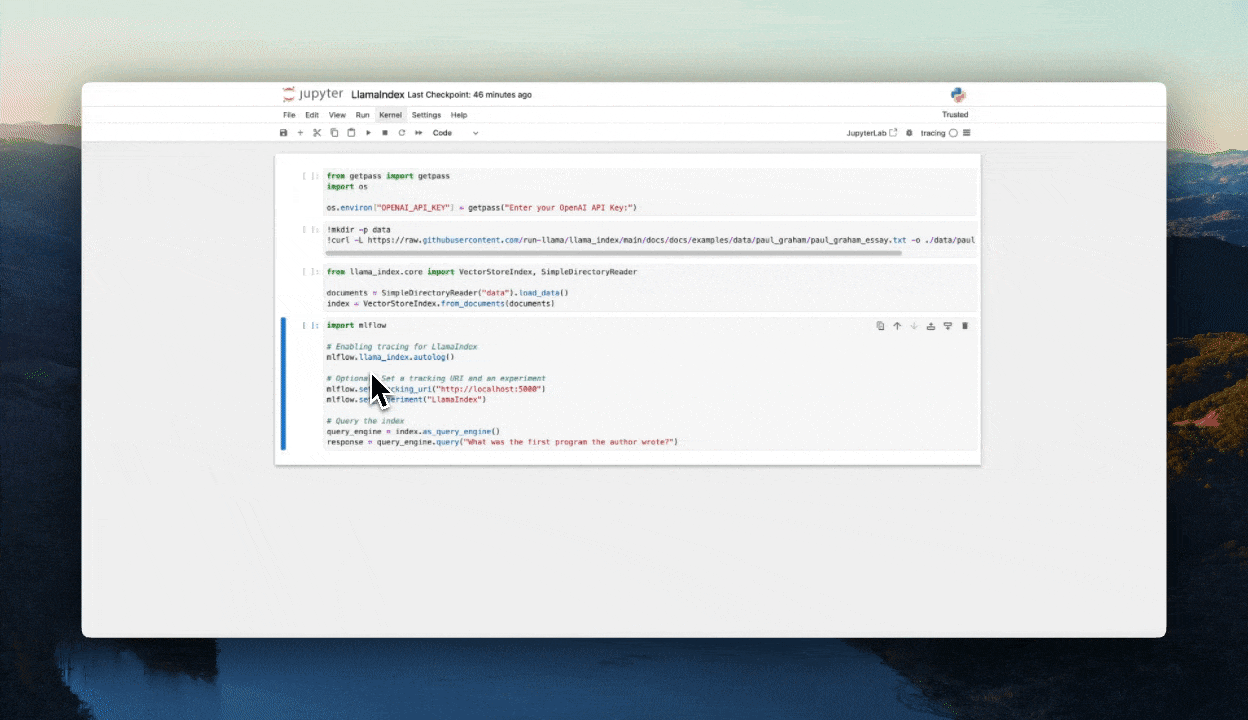Tracing LlamaIndex🦙

LlamaIndex is an open-source framework for building agentic generative AI applications that allow large language models to work with your data in any format.
MLflow Tracing provides automatic tracing capability for LlamaIndex. You can enable tracing
for LlamaIndex by calling the mlflow.llama_index.autolog() function, and nested traces are automatically logged to the active MLflow Experiment upon invocation of LlamaIndex engines and workflows.
import mlflow
mlflow.llama_index.autolog()
MLflow LlamaIndex integration is not only about tracing. MLflow offers full tracking experience for LlamaIndex, including model tracking, index management, and evaluation. Please checkout the MLflow LlamaIndex Flavor to learn more!
Example Usage
First, let's download a test data to create a toy index:
!mkdir -p data
!curl -L https://raw.githubusercontent.com/run-llama/llama_index/main/docs/docs/examples/data/paul_graham/paul_graham_essay.txt -o ./data/paul_graham_essay.txt
Load them into a simple in-memory vector index:
from llama_index.core import VectorStoreIndex, SimpleDirectoryReader
documents = SimpleDirectoryReader("data").load_data()
index = VectorStoreIndex.from_documents(documents)
Now you can enable LlamaIndex auto tracing and start querying the index:
import mlflow
# Enabling tracing for LlamaIndex
mlflow.llama_index.autolog()
# Optional: Set a tracking URI and an experiment
mlflow.set_tracking_uri("http://localhost:5000")
mlflow.set_experiment("LlamaIndex")
# Query the index
query_engine = index.as_query_engine()
response = query_engine.query("What was the first program the author wrote?")
LlamaIndex workflow�
The Workflow is LlamaIndex’s next-generation GenAI orchestration framework. It is designed as a flexible and interpretable framework for building arbitrary LLM applications such as an agent, a RAG flow, a data extraction pipeline, etc. MLflow supports tracking, evaluating, and tracing the Workflow objects, which makes them more observable and maintainable.
Automatic tracing for LlamaIndex workflow works off-the-shelf by calling the same mlflow.llama_index.autolog().
To learn more about MLflow's integration with LlamaIndex Workflow, continue to the following tutorials:
- Building a Tool-calling Agent with LlamaIndex Workflow and MLflow
- Building Advanced RAG with MLflow and LlamaIndex Workflow
Disable auto-tracing
Auto tracing for LlamaIndex can be disabled globally by calling mlflow.llama_index.autolog(disable=True) or mlflow.autolog(disable=True).